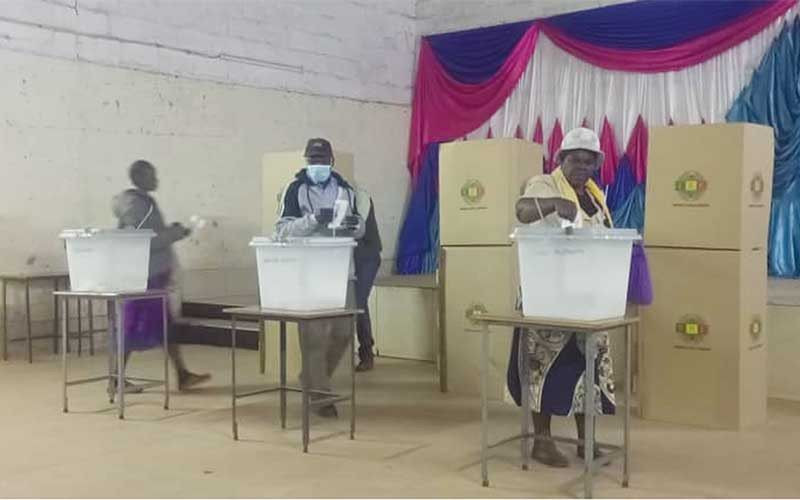
EMMERSON Mnangagwa of the Zimbabwe African National Union Patriotic Front (Zanu PF) was recently declared the winner of Zimbabwe’s most important presidential race. Nelson Chamisa, the leader of the Citizens Coalition for Change (CCC), came in second place with 44% of the vote, according to the Zimbabwe Electoral Commission.
Mnangagwa garnered 52,6% of the votes. As was to be expected, Chamisa and his opposition party disagreed with the outcome because they feel that the process was not free and fair and that it was also rigged.
Since it has become the norm for every election in Zimbabwe since 2002, it is fair to say that very few people, if any, were expecting anything new to come from the court contest. The 2002 election court case, whereby the late leader of the MDC Morgan Tsvangirai, contested the victory of the late former President Robert Mugabe, has not yet been concluded and has since been overtaken by events.
Following 2002, subsequent elections adopted the same format. Voters cast their ballots, results are declared and the opposition contests them, alleging that the election was manipulated. The findings from observer missions indicate that the electoral process was not free and fair. The ruling party encourages the opposition to approach the courts, where such cases are dismissed for a lack of evidence. The claim that the courts are corrupt and captured is frequently made after electoral court contests are dismissed.
And with that, the four steps of reverting to factory settings resistance, resignation, acceptance, and embracing — have been fully completed. What’s more, while those who would have blindly voted for the ruling party celebrate and make use of the meagre privileges of their membership to the ruling party even though there is nothing to celebrate, the opposition prepares its supporters for the next elections.
Elections are supposed to be a process by which voters select the person they want to lead them, primarily based on the candidates’ ideas and who they believe has the best policies to address their future aspirations. Elections are supposed to reflect the preferences of the electorate, but when the electorate has limited power, the ruling class manipulates the process to either obtain or hold onto power.
This is frequently referred to as electoral fraud, also known as election manipulation, vote fraud or vote rigging, and it entails unlawfully interfering with an election by either boosting the vote share of a preferred candidates, lowering the vote share of rival candidates, or both.
It is even more depressing that democracy has conditioned the populace to place their hopes in elections and elected officials; if these officials are skilled at rigging, it means that the wishes of the populace are being subverted. One of the numerous peculiarities of democracy is that, outside its bounds, it does not provide the people with a means of recourse, and going beyond those bounds is regarded as illegitimate and amounting to a coup or treason.
- Letters: Is Zim ready for elections?
- Mnangagwa, Chamisa must be stopped for Zim to win
- Zec analogous to a midwife
- Elections won’t change anything as long as leaders are not held accountable
Keep Reading
Africa is today dealing with political unrest in West and Central Africa, as coups in Gabon, Niger, Burkina Faso, and other countries have attracted attention from around the world. To prevent potential coups, several African nations have responded by axing their military leaderships. Coups are terrible if the goal is democracy, but they can be considered as a means of ending a dictatorship when the people’s wishes are being ignored by those in authority.
Again, the actual question in all this should be: What is a vote and what does it mean to have an election? Why does this process not work in Africa? Do those who queue for many hours to cast their vote understand the connection between their vote and their future? Or do some people believe that it was just a game played on that particular day, with the rest resigned to fate?
All these questions, along with others, point to a troubling and depressing scenario, one that may indicate that Africa as a continent rushed into democracy before the populace attained the needed level of literacy to participate in it. As was already mentioned, most African voters do not understand the connection between their vote, their level of poverty, and their potential to use the vote to change their circumstances.
They, therefore, dance to the tune appropriate for them at a given time.
It is simple for those vying for political power to lure those who are less intelligent and more gullible. Once they are in power, they can loot the country’s resources as much as they want with little to no accountability because the populace is ill-disposed to care. They revolt and stage a coup as soon as they awaken, whenever that may be.
Coincidentally, the army is their only source of hope and power at these times. That is how the African political power matrix is messed up.







